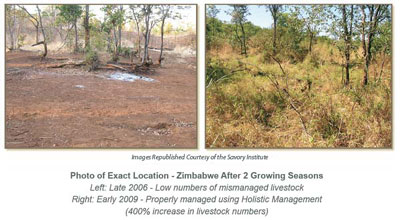by Rona Fried
We’ve written many articles on the ability of soil to absorb and sequester carbon dioxide – literally pulling it out of the air.
But the soil has to be healthy and that means adding compost. If it is healthy, it’s the easiest and possibly only way to actually reverse climate change.
I didn’t realize however, that putting down compost just once makes a difference. Research at University of California/ Berkeley shows that compost applied to 5% of the state’s grazing land would store a year’s worth of emissions from conventional farms and forestry operations there. If that’s increased to 25% of grazing land, the soil would absorb 75% of California’s total annual emissions.
"This is one thing we can do that certainly can make a difference. It’s inexpensive, it’s low technology, it’s good land use, it solves multiple problems," bio-geochemist Whendee Silver told the San Francisco Chronicle. In his experiments on grazing lands, the soil was still sequestering carbon six years later and he believes it will remain that way for decades.
There’s a lot of soil to build because half of the planet’s topsoil has been lost in the last 150 years, according to World Wildlife Fund.
While there’s plenty of cow manure to spread around, it has to be aged or combined with other kinds of organic waste, such as from crops and grass cuttings to create compost. Green manure used on its own emits methane.
It should be required in California because another major benefit is that it shields the soil from drought. Compost builds the soil so that it holds water and nutrients and much less irrigation is needed to grow crops and grass for grazing.
It’s really time to get on the compost bandwagon and stop sending this "liquid gold" to landfills where it turns into methane. 30-40% of the "waste" entering landfills is compostable food scraps from homes, restaurants, schools, etc.
Where would we ever get enough compost to spread on millions of acres of land?
San Francisco requires residents and businesses to put out green waste for composting, and now runs the biggest composting operation in the world, recycling 700 tons of this "waste" into compost every day.
Other cities can do that too, not to mention farms and ranches.
And it creates jobs.
"For a lot of people, this sounds a little fantastic," Silver told the San Francisco Chronicle. "There’s nothing magic about it. Soil is a major source of carbon, and we’ve been bleeding it into the atmosphere for many, many years through plowing, overgrazing and poor agricultural practices. So anything we can do to get some of that carbon back into the soil is going to be beneficial."
Grazing is the single largest land use on the planet, and most grazing lands are degraded, which simply means they have lost too much carbon. Degraded lands tend to be taken over by invasive plants, displacing natives that store much more carbon.
Another solution is Alan Savory’s: Can Cows Stop Climate Change?

The people involved in these experiments are so excited by the results that they want to turn it into a global effort.
They are working on incorporating soil carbon offsets into California’s cap-and-trade program, which would give ranchers credits when they spread compost.
And the Natural Resources Conservation Agency (a division of the Department of Agriculture started because of the dust bowl) is making carbon farming an integral part of voluntary protocols for soil preservation, along with no-till farming and the use of cover crops – the basics of organic agriculture practices.
You never know – we could end up with organic agriculture after all!
Read our articles, To Solve Climate Change, Look to the Soil and Sequestering Carbon, Helping Pollinators Along Our Highways.
Groups focused on rejuvenating the world’s soil include the UN’s Global Soil Partnership and Conservation Agriculture program. There is even a World Soil Day on December 5 and the upcoming 2015 International Year of Soils to raise awareness of sustainable soil management.
Read the full article:

Way to go – – using all the plant we harvest our
food(s) from!
Composting is GREAT all year long (yes, even in cold/snowy areas)…sustainability, recycling and you can get some serious nutrients out of it for your garden. 🙂 Nice article.